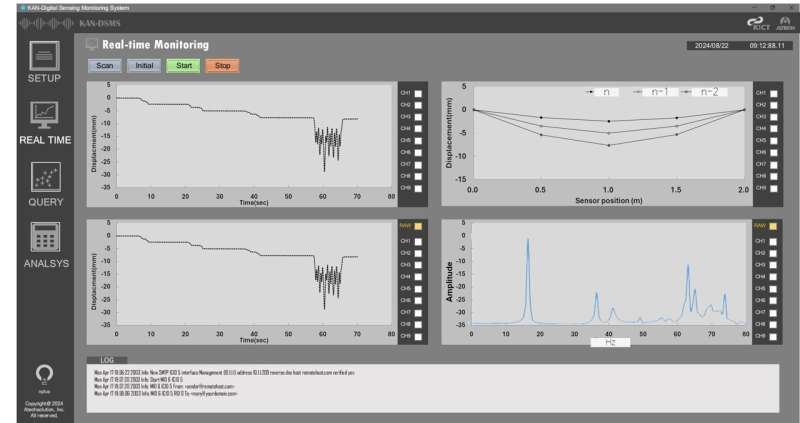
November 22, 2024 by National Research Council of Science and Technology
Collected at: https://techxplore.com/news/2024-11-bridge-safety-digital-based.html
Korea Institute of Civil Engineering and Building Technology developed a smart monitoring system that applies digital sensing technology to maintain and manage small- and medium-sized aging bridges.
In general, bridge maintenance monitoring technology is applied to long-span bridges such as cable-stayed bridges and suspension bridges. This monitoring system consumes a lot of resources for design and installation, and the system configuration itself is complex, so there are limits to its application for maintenance of small- and medium-sized bridges.
Currently, the most actively used bridge monitoring system is operated based on analog measurement and sensing. Due to the nature of the signal, the analog method is vulnerable to electrical noise, so there is a high possibility of data quality deterioration, and there are limitations in effectively processing various types of signals collected from sensors. Additionally, because analog sensors require 1:1 wiring between the sensor and the receiver, the configuration complexity and installation cost increase dramatically as the system grows.
The digital sensing technique adopted by KICT to overcome the limitations and problems of analog sensors has a low possibility of data quality deterioration due to noise. It also has excellent data transmission speed and processing ability, making up for the shortcomings of analog sensing.
 Summary of this project which aims ‘Digital sensing based smart monitoring system for aged bridge’ development. Also, it shows the project have focused to international joint research with Vietnam to solve the local infrastructure maintenance and management issues. Credit: Korea Institute of Civil Engineering and Building Technology
Summary of this project which aims ‘Digital sensing based smart monitoring system for aged bridge’ development. Also, it shows the project have focused to international joint research with Vietnam to solve the local infrastructure maintenance and management issues. Credit: Korea Institute of Civil Engineering and Building Technology It shows test for the digital monitoring sensor , The digital sensors and developed system are evaluated its performance, stability, and field applicability. Credit: Korea Institute of Civil Engineering and Building Technology
It shows test for the digital monitoring sensor , The digital sensors and developed system are evaluated its performance, stability, and field applicability. Credit: Korea Institute of Civil Engineering and Building Technology
In addition, by using the BUS communication serial connection method, multiple sensor data can be integrated and transmitted through a single wire. This method is widely used in various applications due to its simplicity and economic efficiency. Furthermore, it has the advantage of complementing and replacing analog sensing in terms of simplification of system configuration.
In the case of Vietnam, which co-participated in the study, various transportation infrastructure, including bridges, are being built along with economic growth, but effective maintenance techniques are more required. Although overseas manpower and technology are being introduced to perform facility maintenance, only a few applications are being made to long-span bridges and large structures due to a limited maintenance budget and lack of technology and professional manpower.
Safety monitoring for general maintenance of small- and medium-sized bridges has not been implemented, so it is necessary to introduce efficient monitoring techniques suited to local conditions.
The research team led by Dr. Dong-woo, Seo, at the Department of Structural Engineering Research of KICT, developed a monitoring system that can be efficiently applied to small- and medium-sized aging bridges through digital sensing techniques, and verified the performance of the system by demonstrating it on site with a research team at UTC in Vietnam. The measurement performance and local applicability of the based smart monitoring system were confirmed.
In particular, the smart monitoring technique developed by KICT can accurately calculate the vertical displacement of the target bridge with simple sensor placement and coordinate input. This is provided to the user in real time through a GUI (graphical user interface), and simple operations are required to operate the system and produce results.
As a result of local verification in Vietnam, the bridge vertical displacement and actual measured deflection results showed an accuracy of more than 95%.
Dr. Seo said, “The biggest advantage of the developed digital smart monitoring technique is user-friendliness. Easy to use and economical monitoring technique through a simple system installment method using digital sensors and a GUI-based data analysis system.”

Leave a Reply